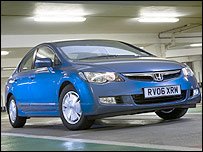Hybrid transit buses are starting to catch on with transit agencies around the country. But what’s the real story with these buses? Are they really cleaner and more fuel efficient than their conventional diesel counterparts?
Under the Hood & Around the Nation
Under the Hood & Around the Nation
 Hybrid bus technology is similar to that used in hybrid cars and trucks, with options for both parallel and series drive train designs. These buses employ similar technology including regenerative braking, electric motors, and battery storage. One main difference is that most hybrid buses are coupling diesel-fueled engines with electric motors instead of the typical gasoline-electric hybrid configurations available in light duty vehicles. Maximizing the benefits from these buses requires optimizing the hybrid system for the transit bus routes, which might be affected by the terrain the bus travels or whether the bus frequently travels at freeway speeds or stays on city streets.
Hybrid bus technology is similar to that used in hybrid cars and trucks, with options for both parallel and series drive train designs. These buses employ similar technology including regenerative braking, electric motors, and battery storage. One main difference is that most hybrid buses are coupling diesel-fueled engines with electric motors instead of the typical gasoline-electric hybrid configurations available in light duty vehicles. Maximizing the benefits from these buses requires optimizing the hybrid system for the transit bus routes, which might be affected by the terrain the bus travels or whether the bus frequently travels at freeway speeds or stays on city streets. The majority of hybrid transit buses are currently being manufactured by three companies; General Motors(GM) Allison transmission, British Aerospace Engineering Systems, and ISE corporation. GM is planning to use the same technology from their hybrid bus to make their first real hybrid, a pickup to be offered in 2007. Hopefully the ability to share technology across vehicle types will allow them to keep costs down and compete with Toyota (though it is not clear that GM is so confident). Transit agencies in New York City, Seattle, San Francisco, and other cities around the country are investing in hybrid diesel buses, which promise to be more fuel efficient and lower emitting than conventional diesel buses.
Hybrid Bus Emissions
As with other hybrid technology used in cars and trucks, there is a perception that hybrid buses not only save fuel, but inherently are cleaner than their non-hybrid counter parts. As we have previously noted on HybridBlog, hybrids can have lower emissions, but they don’t automatically come that way.
The same goes for hybrid transit buses. A recent study by the University of Connecticut measured the particulate emissions from two hybrid transit buses and two conventional diesel buses in over-the-road tests. The researchers found no decrease in particulate emissions from the hybrid buses compared with the conventional diesel buses. Of course, this would be much less of an issue if the buses were equipped with diesel particulate filters that can reduce particulate emissions by more than 85 percent. Diesel particulate filter technology can be employed on both conventional and hybrid diesel buses.
Studies have shown lower emissions of nitrogen oxide (NOx) and other smog-forming emissions from hybrid buses than conventional diesel buses in full chassis dynamometer testing. However, the current Environmental Protection Agency (EPA) emission certification method is based on bench testing the diesel-fueled engine only and does not account for the bus configuration and the full benefits of the hybrid drive system. As an interim solution, California is crediting hybrid diesel buses with a 25 percent NOx emission reduction over the engine certification values. Until a proper certification method is established, emission comparisons of hybrid buses will continue to be difficult.
Fuel Economy: Potential Promise, but Questions Still Remain
The fuel economy of hybrid transit buses is all over the map, but all are improvements over conventional technology. There are reports from transit agencies of fuel economy improvements of 10 percent all the way up to 50 percent, depending on variables such as series or parallel hybrid design, system optimizations, and the type of bus route. Some over-the-road tests are being carried out by the National Renewable Energy Laboratory (NREL), but final results have not yet been released. However, preliminary results are promising with fuel economy tests showing a 25 percent to 50 percent increase for the hybrid buses being evaluated, depending in part on the conventional diesel used in the comparison. (See NREL’s website for further info). The Connecticut Department of Transportation is also performing in-use testing that shows hybrid buses netting a 35 percent fuel economy improvement over their fleet average, but only 10 percent greater than a comparable conventional diesel bus. More real-world testing and data collection, along with improvements to the hybrid systems themselves, should result in better estimates of fuel economy improvements of the different types of hybrid buses.
One interesting development in the hybrid bus world is the introduction of gasoline hybrid buses. Diesels have typically been the power plant of choice for urban buses because of the extra torque diesel engines offer to haul a busload of people. Hybrid technology is enabling gasoline buses to compete in the same market because of the boost in torque the electric motor can give and the increased fuel efficiency that hybrid drive technology offers. The gasoline hybrids offered by ISE Corporation are certified to lower emission standards for NOx and particulate matter than their hybrid diesel and even natural gas counterparts.
Cost and Maintenance
How much do hybrid buses cost? Hybrid buses can cost up to $500,000, a significant increase over a standard diesel transit bus, the cost of which is closer to $300,000. Natural gas buses, a lower-emission alternative to conventional diesel transit buses, are generally $20,000 to $50,000 more than a diesel bus. Natural gas buses will likely continue to be able to meet lower NOx emission standards than even diesel hybrid buses until at least 2010 when stronger diesel emission standards go into effect.
One advantage of diesel hybrids over natural gas buses is the relative ease for transit agencies currently using diesel buses to incorporate diesel hybrids into their fleet. Adopting natural gas technology requires installation of natural gas fueling and maintenance infrastructure that is not required for diesel hybrids (though diesel hybrids may require additional training and equipment for maintenance). For transit agencies looking only to purchase a few buses, hybrids may make sense. However, for transit agencies looking to purchase a large number of buses, a closer look at the full life-cycle cost and emission benefits of hybrids versus natural gas buses is required to make sure they are not paying more money for fewer emission benefits.
A Promising, but Cloudy Future
As with hybrid technology in cars and trucks, there is potential for significant fuel economy improvements and emission reductions from hybrid transit buses. So far, the results look promising. We’ll just have to wait and see how far manufacturers can go to improve emissions and fuel economy of hybrid transit buses, while lowering the overall cost of the buses.
Read More..




